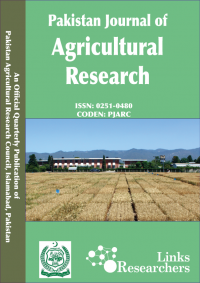ASSESSMENT OF AGRICULTURE SERVICE PROVIDERS' TRAINING ON WATER CONSERVATION TECHNOLOGIES IN POTHWAR REGION
Sumia Bint Zaman*, Waqas Farooq*, Sidra Majeed*, Hasnain Shah*, and Abdul Majid**
ABSTRACT
Water conservation technologies especially, High Efficiency Irrigation Systems (HEIS) remained unpopular due to absence of service sector for these technologies despite of the efforts being carried out since long. Therefore, a training component to prepare a cadre was included in the USDA funded 'Watershed Rehabilitation' project being implemented in collaboration with ICARDA and other NARS partners. The prime objective of these training programmes was to impart training based skills on water conservation technologies. To help in improving the effectiveness, the socioeconomic backup for assessment of these trainings was included as part of the activity. The information for paper is collected from opinions of the participants before and after the training. Descriptive analysis alongwith paired 't' test was used to measure the effectiveness of training. Results indicated higher satisfactory level as majority of the participants were strongly agreed (73%) and agreed (23%) that trainings were participatory and skill development oriented and as 96% agreed or strongly agreed that these were helpful in starting the business as assessment of agriculture service providers (ASPs). It can be concluded that the necessary condition has been fulfilled for water conservation. However, for assessing the impact of these skills towards water conservation technologies needs to be investigated in short and long term scenarios. Therefore, for fulfilling the sufficient condition realizing the real benefits from these trained ASPs further follow up by the concerned technical institutes is recommended.
To share on other social networks, click on any share button. What are these?






